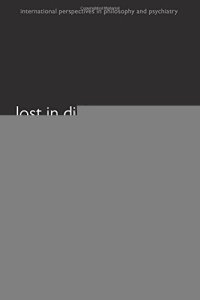
Ebook: Lost in dialogue : anthropology, psychopathology and care
Author: Stanghellini Giovanni
- Tags: Psychiatry, Philosophy, Phenomenological psychology, Dialogue
- Series: International perspectives in philosophy and psychiatry
- Year: 2017
- Publisher: Oxford University Press
- City: Oxford
- Edition: First edition
- Language: English
- pdf
To be human means to be in dialogue. Dialogue is a unitary concept used by the author to address, in a coherent way, three essential issues for clinical practice: 'What is a human being?', 'What is mental pathology'?, and 'What is care?'.
In this book Stanghellini argues that to be human means to be in dialogue with alterity, that mental pathology is the outcome of a crisis of one's dialogue with alterity, and that care is a method wherein dialogues take place whose aim is to re-enact interrupted dialogue with alterity within oneself and with the external world. This essay is an attempt to re-establish such a fragile dialogue of the soul with herself and with others.
Such an attempt is based on two pillars: a dialectic, person-centered understanding of mental disorders and values-based practice. The dialectic understanding of mental disorders acknowledges the vulnerability constitutive of human personhood. It assumes that the person is engaged in trying to cope, solve and make sense of new, disturbing, puzzling experiences stemming from her encounter with alterity. Values-based practice assumes that the forms of human life are inherently plural. Value-pluralism and recognition are the basis for care. This statement reflects the ideal of modus vivendi that aims to find terms in which different forms of life can coexist, and learn how to live with irreconcilable value conflicts, rather than striving for consensus or agreement. Care is a method wherein dialogues take place whose aim is to re-enact interrupted dialogue with alterity within oneself and with the external world. It includes practices that belong both to logic - e.g., the method for unfolding the Other's form of life and to rescue its fundamental structure - and empathy - e.g., the readiness to offer oneself as a dialoguing person and the capacity to resonate with the Other's experience and attune/regulate the emotional field.
In this book Stanghellini argues that to be human means to be in dialogue with alterity, that mental pathology is the outcome of a crisis of one's dialogue with alterity, and that care is a method wherein dialogues take place whose aim is to re-enact interrupted dialogue with alterity within oneself and with the external world. This essay is an attempt to re-establish such a fragile dialogue of the soul with herself and with others.
Such an attempt is based on two pillars: a dialectic, person-centered understanding of mental disorders and values-based practice. The dialectic understanding of mental disorders acknowledges the vulnerability constitutive of human personhood. It assumes that the person is engaged in trying to cope, solve and make sense of new, disturbing, puzzling experiences stemming from her encounter with alterity. Values-based practice assumes that the forms of human life are inherently plural. Value-pluralism and recognition are the basis for care. This statement reflects the ideal of modus vivendi that aims to find terms in which different forms of life can coexist, and learn how to live with irreconcilable value conflicts, rather than striving for consensus or agreement. Care is a method wherein dialogues take place whose aim is to re-enact interrupted dialogue with alterity within oneself and with the external world. It includes practices that belong both to logic - e.g., the method for unfolding the Other's form of life and to rescue its fundamental structure - and empathy - e.g., the readiness to offer oneself as a dialoguing person and the capacity to resonate with the Other's experience and attune/regulate the emotional field.
Download the book Lost in dialogue : anthropology, psychopathology and care for free or read online
Continue reading on any device:

Last viewed books
Related books
{related-news}
Comments (0)